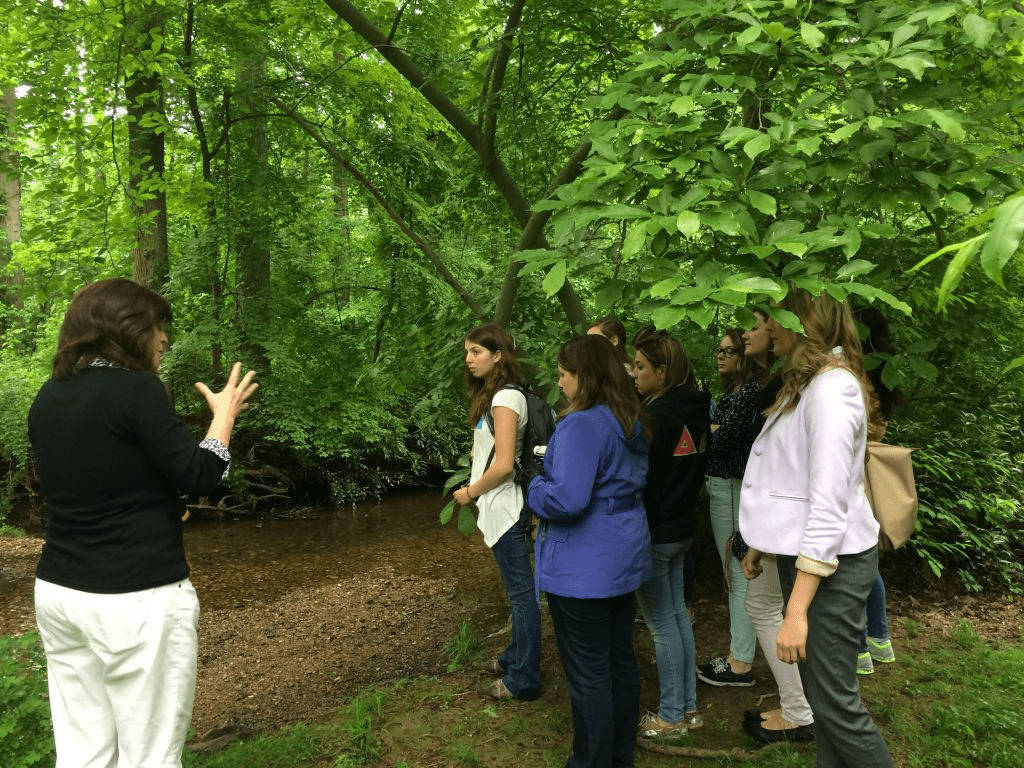Beyond Validation: How NAAEE Accreditation Sparked Program Growth at TCNJ

This post is written by Louise Ammentorp, professor at The College of New Jersey, and Lauren Madden, professor of elementary science education at The College of New Jersey.
Program Overview
The Environmental Sustainability Education (ESE) Minor at The College of New Jersey reflects our commitment to preparing future educators who can effectively integrate environmental concepts across the curriculum. Launched in Spring 2015, our minor takes an interdisciplinary approach, examining environmental sustainability through multiple lenses including science, social sciences, humanities, and the arts.
We created a core of three courses to provide students with a broad and thorough understanding of Environmental Sustainability Education. All three of these courses are requirements for the 5-course minor, but any student is welcome to enroll in any of the courses on its own. In addition to the core courses, students select two elective courses that deepen their knowledge in specific areas of interest related to environmental education. The program culminates with an independent study capstone where students apply their learning through curriculum development, research, or community-based projects. Some examples of recent capstone projects include: Investigating Student Understanding of the New Jersey Offshore Wind Program; Integrating Environmentally Sustainable Agricultural Education in the Classroom; and Nature-Based Elementary STEM Design Challenges.
Our program holds the distinction of being the first NAAEE-accredited program in New Jersey and one of only eleven programs across North America to earn this recognition at the time of accreditation. Since its inception, we have graduated students who have gone on to influence environmental education practices in schools throughout our region and beyond.
Strengthening Our Educational Mission Through Accreditation
Our decision to pursue NAAEE accreditation emerged from our program development process. From the beginning, we recognized the value of grounding our curriculum in established professional standards. The NAAEE Guidelines for Excellence: Professional Development of Environmental Educators provided an ideal framework for ensuring that our program addressed the essential knowledge and skills needed by educators.
When we designed our program, we intentionally aligned our learning outcomes with the Guidelines. As our program matured, seeking accreditation was the logical next step. With support from the School of Education administration, we began the accreditation process and earned accreditation in October 2020.
The NAAEE accreditation process provided a valuable opportunity for deep reflection and program enhancement. We embraced it as an opportunity to assess our program's strengths and identify areas for improvement. The self-study process began with a comprehensive review of our program's alignment with the NAAEE Guidelines for Excellence. This initial analysis revealed that while our curriculum strongly addressed most components of the Guidelines, we could strengthen our assessment and evaluation.
Gathering documentation for the accreditation review prompted us to develop more systematic approaches to tracking program outcomes. For example, through the accreditation process, we implemented a more substantial and purposeful assessment of our students’ capstone projects.
One of the most valuable aspects of the accreditation process was the opportunity to receive feedback from external reviewers with expertise in environmental education. Their insights validated our program's strengths while also providing constructive suggestions for improvement. The review process was rigorous yet supportive, with reviewers genuinely interested in helping us strengthen our program rather than simply evaluating it.
The Benefits of NAAEE Accreditation
Earning NAAEE accreditation has provided many benefits that have strengthened both our program and our graduates' professional opportunities.
For our students, accreditation provides assurance that their preparation meets nationally recognized standards in the field. It signals to potential employers that our graduates are equipped with the comprehensive knowledge and skills needed to effectively teach about the environment and sustainability. This credential has become increasingly valuable as schools and districts place greater emphasis on environmental literacy and sustainability initiatives. The visibility that comes with accreditation has also facilitated partnerships with local environmental education centers, nature centers, and school districts that seek well-prepared environmental educators.
Perhaps most significantly, our NAAEE accreditation has served as a catalyst for program expansion. Building on the success and credibility of our accredited undergraduate minor, we developed a Graduate Certificate in Environmental Sustainability Education. This four-course certificate is designed for practicing Pre-K–12 teachers who wish to transform their teaching practice with interdisciplinary perspectives on Environmental Sustainability Education. Coursework is focused on applying knowledge and designing solutions to many of the challenges we face in our classrooms and in the world. Additionally, we began a partnership with the world-renowned American Museum of Natural History to offer courses in its Seminar on Science Series as elective options within the graduate certificate program.
Working collaboratively across campus departments, we recently established a new Environmental Sustainability major at TCNJ. This cross-disciplinary initiative demonstrates how a program like our ESE minor can support curriculum development more broadly across campus.
Another significant benefit of our NAAEE accreditation has been increased participation in the broader environmental education professional community. Our accreditation has created opportunities for our students, faculty, and teacher partners to present at NAAEE conferences, showcasing innovative practices and research emerging from our program. These collaborative presentations have strengthened our partnerships with local schools and provided authentic examples of how the theories and approaches taught in our program translate to classroom practice.
Final Thoughts
We are proud to be part of a network of accredited programs that collectively contribute to elevating the quality and impact of environmental education.
Our experience affirms that accreditation is not just about receiving external validation; it is about participating in a process of continuous improvement that ultimately benefits our students and the children they will educate throughout their careers.
As environmental challenges grow more complex and pressing, we remain dedicated to preparing educators who can foster the knowledge, skills, and motivations needed for environmental literacy and responsible environmental action.

Photo Credit: The College of New Jersey

Photo Credit: Lauren Madden
Join eePRO today and be a part of the conversation!
Comment and connect with fellow professionals in environmental education. Join eePRO >



